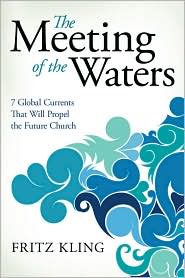 Fritz Kling, The Meeting of the Waters: 7 Global Currents That Will Propel the Future Church (Colorado Springs, CO: David C. Cook, 2010). $16.99, 240 pages.
Fritz Kling, The Meeting of the Waters: 7 Global Currents That Will Propel the Future Church (Colorado Springs, CO: David C. Cook, 2010). $16.99, 240 pages.
From 2006-2007, Fritz Kling and his associates facilitated a “Global Church Listening Tour” with 151 church leaders in 19 countries. The Meeting of the Waters is his report on emerging trends that will affect the mission of the worldwide church. This report is timely since younger Christians are rethinking both the nature of the church’s mission and of the missionary calling.
Here are the trends that emerged through Kling’s conversations with church leaders:
- Mercy: The church must address the physical and material needs of humanity, not just their spiritual needs.
- Mutuality: The church in the developed world must interact with the majority world as peers, not as patrons who seek to control the use of their patronage.
- Migration: The church must minister to populations that are increasingly multinational, multiracial, and multiethnic.
- Monoculture: The church must realize that globalization is making local cultures increasingly similar to one another, and this face presents both challenges and opportunities.
- Machines: The church must utilize technology (especially computers) to accomplish its mission.
- Mediation: The church must take the lead in making peace and resolving the conflicts that increasingly characterize global culture.
- Memory: The church must take into account the fact that memory (especially of tragedy and oppression) shapes the way that people respond to the gospel.
If you are the pastor, missionary, or denominational leader, I urge you to read The Meeting of the Waters. It will not answer all your questions about how the church should carry out its mission in the postmodern world, but it will help you understand the questions that need to be asked and answered.
—–
If you thought this review was helpful, please vote Yes on my Amazon.com page.


I haven’t read the book but it kind of sounds like the author has “Social Gospel” leanings. Mark Driscoll said at a recent seminar that we needed to be Cross-Centered, not Cause-Centered.
With all due respect to Mark Driscoll, Jesus said we’re supposed to feed the hungry, clothe the naked, and visit the imprisoned. James said that helping widows and orphans in their distress is pure religion. Paul said that those who did not help their poor family members have denied the faith. Showing mercy to people’s physical needs is not the social gospel, it’s the gospel in action: the cause that flows from the cross, so to speak.
I agree with your last sentence that showing mercy to people’s physical needs is one very important facet of the gospel in action that flows from the cross. When we are cross-centered its not an either-or proposition, but rather the good news of Christ’s forgiveness of our sins impels us not only to proclaim the gospel but also pursue causes of compassion.
However, I read the first sentence of the book’s description online, “A young Christian from Ireland moves to India—not to evangelize but to help girls escape prostitution.”… as if not evangelizing is a good thing? And then I read the seven bullet points above that each start “The Church must”, with only the most tangential references to Christ or the Holy Spirit, I can’t help but wonder if this is a book about man-based ambitions. Like I said, I haven’t read the book, but can you understand why I would be a little wary of this author?
The brief descriptions following the 7 bullet points are mine; only the M words are Kling’s. I don’t think he is advocating a different mission for the church. He is only saying what emerging trends the church must engage as it carries out it’s mission. I hope that clarifies the intent of the book.